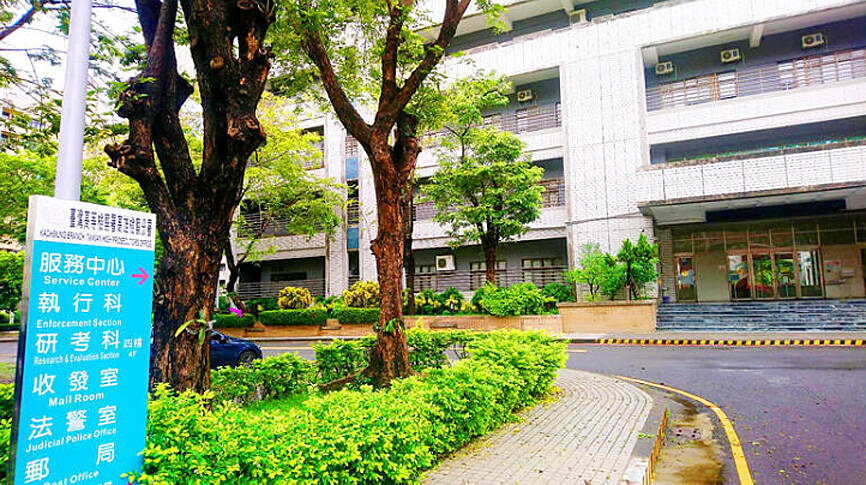Three Taiwanese affiliated with the China Unification Promotion Party (CUPP) were yesterday charged with developing a spy network to infiltrate the Taiwanese military, contravening the National Security Act (國家安全法).
The Kaohsiung branch of the High Prosecutors’ Office charged Wen Lung (溫瓏), who runs a business in China, along with two retired Taiwanese military officers, Chu Hsin-yu (朱新瑜) and Chiang Chiung-lin (江瓊麟), both members of the CUPP’s Shih Chung chapter.
Wen started a business in China in 2016 to import agricultural technology and specialty crops from Taiwan for the Chinese market, prosecutors said, alleging that he was recruited by Beijing’s United Front Work Department to target Taiwanese.

Photo: Pao Chien-hsin, Taipei Times
Wen had made several media appearances touting the benefits of doing business in China, and urging Taiwanese to work there, the indictment showed.
He got to know Chiang and Chu and allegedly invited them on all-expenses-paid trips to China, it said.
Wen arranged for the two retired military officers to meet with “united front” officials, and the duo allegedly promised to use their personal connections and networks in Taiwan to recruit military personnel as spies and procure confidential materials to pass on to their Chinese handlers, prosecutors said.
The trio allegedly worked to form a spy network in Taiwan including both retired and active Taiwan military personnel, prosecutors said.
Law enforcement officers in May raided residences in Kaohsiung and other cities to gather evidence and summon the trio for questioning.
The trio have been charged under Article 2 of the National Security Act, which prohibits a person from working for China, Hong Kong, Macau or foreign hostile forces to “fund, direct or develop an organization,” prosecutors said.
The act also prohibits “spying on or collecting confidential documents, messages, articles or electromagnetic records that are for official use.”
During questioning, the trio admitted to having met with united front officials and other Chinese intelligence officers, prosecutors said.

Japanese footwear brand Onitsuka Tiger today issued a public apology and said it has suspended an employee amid allegations that the staff member discriminated against a Vietnamese customer at its Taipei 101 store. Posting on the social media platform Threads yesterday, a user said that an employee at the store said that “those shoes are very expensive” when her friend, who is a migrant worker from Vietnam, asked for assistance. The employee then ignored her until she asked again, to which she replied: "We don't have a size 37." The post had amassed nearly 26,000 likes and 916 comments as of this

US President Donald Trump said "it’s up to" Chinese President Xi Jinping (習近平) what China does on Taiwan, but that he would be "very unhappy" with a change in the "status quo," the New York Times said in an interview published yesterday. Xi "considers it to be a part of China, and that’s up to him what he’s going to be doing," Trump told the newspaper on Wednesday. "But I’ve expressed to him that I would be very unhappy if he did that, and I don’t think he’ll do that," he added. "I hope he doesn’t do that." Trump made the comments in

Tourism in Kenting fell to a historic low for the second consecutive year last year, impacting hotels and other local businesses that rely on a steady stream of domestic tourists, the latest data showed. A total of 2.139 million tourists visited Kenting last year, down slightly from 2.14 million in 2024, the data showed. The number of tourists who visited the national park on the Hengchun Peninsula peaked in 2015 at 8.37 million people. That number has been below 2.2 million for two years, although there was a spike in October last year due to multiple long weekends. The occupancy rate for hotels

A cold surge advisory was today issued for 18 cities and counties across Taiwan, with temperatures of below 10°C forecast during the day and into tonight, the Central Weather Administration (CWA) said. New Taipei City, Taipei, Taoyuan and Hsinchu, Miaoli and Yilan counties are expected to experience sustained temperatures of 10°C or lower, the CWA said. Temperatures are likely to temporarily drop below 10°C in most other areas, except Taitung, Pingtung, Penghu and Lienchiang (Matsu) counties, CWA data showed. The cold weather is being caused by a strong continental cold air mass, combined with radiative cooling, a process in which heat escapes from